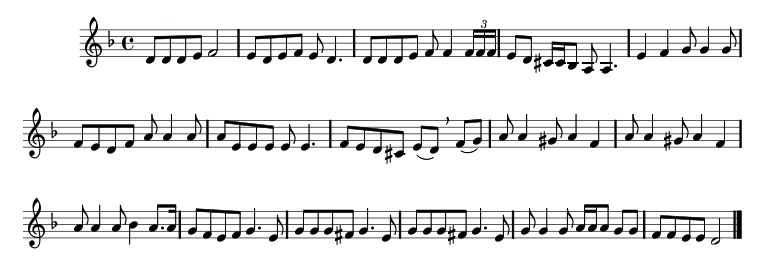| האַרשל איז געווען אײנער פֿון די גרױסע |
Harshl iz geven eyner fun di groyse, |
Harshl était un caïd |
Harshl was one of the big shots |
| וווּ ער איז געקומען האָט ער געהײסן |
Vu er iz gekumen, hot er geheysn |
Partout où il allait il commandait |
Wherever he went, he'd order |
| שטעלן אַ כּוסה |
shteln a koyse, |
à boire pour tous |
drinks for everyone |
| הײַנט גײט האַרשל אַראָפּגעלאָזט די נאָז |
Haynt geyt Harshl aropgelozt di noz, |
Maintenant Harshl va la tête basse |
Today Harshl walks around looking down in the mouth |
| ער האָט געקריגן לײגעס |
Er hot gekrign leyges, |
Il s'est fait chasser |
he was beaten up |
| ווײסט ער נישט פֿאַר וואָס |
veyst er nisht far vos. |
Il ne sait pas pourquoi |
he doesn't know why |
|
|
|
|
| האַרשל וווּ גײסטו |
Harshl, vu geystu? |
Harshl, où vas-tu? |
Harshl, where are you going? |
| האַרשל וווּ שטײסטו |
Harshl, vu shteystu? |
Harshl, où te tiens-tu? |
Harshl, where are you standing? |
| האַרשל וווּ ביסטו |
Harshl, vu bistu |
Harshl, où es-tu |
Harshl, where are you |
| מיט דײַנע גראָבע הענט |
mit dayne grobe hent? |
avec tes mains épaisses? |
with your plain hands? |
| דו האָסט שױן נישט קײן הענט |
Du host shoyn nisht keyn hent, |
Tu n'as plus de mains |
you have no more hands |
| דו האָסט שױן נישט קײן ווענט |
Du host shoyn nisht keyn vent, |
Tu n'as plus de territoire |
you have no more territory |
| דו וועסט שױן נישט נעמען |
Du vest shoyn nisht nemen |
Tu ne prendras plus |
you won't be taking |
| אױף שווענטאָיערסקע קײן פּראָצענט |
oyf shventoyerske keyn protsent. |
de pourcentage rue Szwientojerska |
a percentage on Szwientojerska street |
|
|
|
|
| האַרשל איז געווען דער שענסטער פֿון זײ אַלע |
Harshl iz geven der shenster fun zey ale, |
Harshl était le plus beau de tous |
Harshl was the handsomest of them all |
| איז געקומען מאיר-טשאָמפּל |
Iz gekumen Meyer-Tshompl, |
Meyer-Tshompl est arrivé |
Meyer-Tshompl came along |
| און האָט אים צוגענומען די כּלה |
un hot im tsugenumen di kale; |
Lui a pris sa fiancée |
and took away his bride |
| הײַנט גײט האַרשל אַראָפּגעלאָזט די נאָז |
Haynt geyt Harshl aropgelozt di noz, |
Maintenant Harshl va la tête basse |
Today Harshl walks around looking down in the mouth |
| ער האָט געקריגן לײגעס |
Er hot gekrign leyges, |
Il s'est fait frapper |
he was beaten up |
| ווײסט ער נישט פֿאַר וואָס |
veyst er nisht far vos. |
Il ne sait pas pourquoi |
he doesn't know why |
|
|
|
|
| האַרשל וווּ גײסטו |
Harshl, vu geystu... |
Harshl, où vas-tu... |
Harshl, where are you going... |
|
|
|
|
| האַרשל האָט געשפּילט אָרדע-באָרדע-שאָרדע |
Harshl hot geshpilt orde-borde-shorde, |
Harshl jouait au tic-tac-toe |
Harshl was playing tic-tac-toe |
| איז געקומען יונה-מעכל |
Iz gekumen Yoyne-Mekhl, |
Yoyne-Mekhl est arrivé |
Yoyne-Mekhl came |
| אים אָנגעהאַקט די מאָרדע |
im ongehakt di morde; |
Lui a cassé la machoire |
and broke his jaw |
| הײַנט גײט האַרשל אַראָפּגעלאָזט די נאָז |
Haynt geyt Harshl aropgelozt di noz, |
Maintenant Harshl va la tête basse |
Today Harshl walks around looking down in the mouth |
| ער האָט געקריגן לײגעס |
Er hot gekrign leyges, |
Il s'est fait chasser |
he was beaten up |
| ווײסט ער נישט פֿאַר וואָס |
veyst er nisht far vos. |
Il ne sait pas pourquoi |
he doesn't know why |
|
|
|
|
| האַרשל וווּ גײסטו |
Harshl, vu geystu... |
Harshl, où vas-tu... |
Harshl, where are you going... |
|
|
|
|







